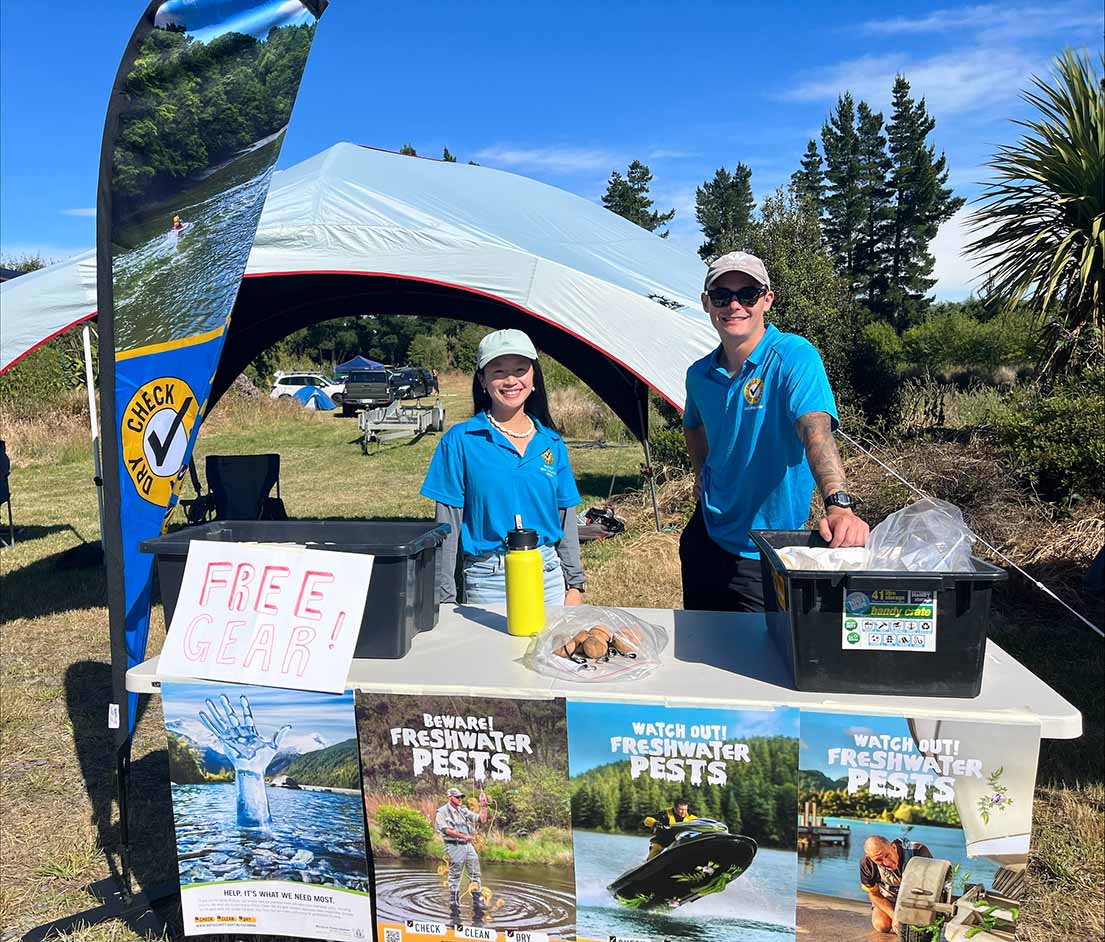Check, Clean, Dry to stop freshwater pests
The invasion of freshwater pests into Waitaha/Canterbury's waterways affects us all. If you partake in any freshwater activity, water weeds can affect your success, safety and enjoyment of our waterways.
Water weeds ruin valuable ecosystems by inhibiting growth of native water plants and reducing likely spawning areas for many types of fish.
Some of the freshwater pest species present in Aotearoa New Zealand exist within our region, but many of our lakes and rivers remain pest-free.
To help keep it this way, it's important that equipment and vessels are properly cleaned and decontaminated before entering any waterway.
With any invasive species remember, even if you can't see it, if it's wet, it's a threat!
How to prevent freshwater weed invasions
Check
Check boats, trailers and anything else that was in the water, including your dog’s fur and paws if your dog is in the water with you, for any plant material and remove it. Even if the plant appears dry and dead, it may still survive and start a new infestation. Leave debris at the site or, if you find any later, treat and dispose of it in the rubbish. Do not wash down drains.
Clean
Wash all equipment (eg, nets, machinery, footwear and clothing) thoroughly with an appropriate decontamination solution (10% detergent for 10 minutes or 2% bleach for at least one minute in water) before putting it in any new waterway.
Dry
If you can't clean your gear or animals, restrict use to a single waterway OR dry completely to the touch inside and out, and leave to dry for at least another 48 hours.
Particular attention needs to be given to those users who are moving between different waterbodies, catchments, regions and islands with the same vessels and/or equipment.
What else can I do to prevent freshwater weed invasions?
- Familiarise yourself with the freshwater and marine pests listed in the pest search. That way, if you encounter a pest species while enjoying our waterways, you’ll know what to do to help our control efforts.
- Do not throw any aquarium or pond material into waterways. Instead, put all unwanted pond material on the garden or compost - your small oxygen weed may become the next threat to native fish, birds and plants.
- Do not give plants or plant parts away to others until you are sure that they are not a threat to our waterways.
- Make wise decisions on how to avoid increasing nutrient levels in waterways from fertiliser. High levels of nutrients running into waterways tend to encourage vigorous growth of some weeds.
How to identify and report pests
If you’re enjoying our waterways and believe you have seen a pest species, check out the pest search and toggle the filter for pest type to freshwater or marine.
Each pest listed has identification information, control instructions and tips on how not to spread it. If you have identified a pest, report it here.
Guidelines for running a waterway event
If you're running an event in a Canterbury waterway, it's important to tell participants about the need to Check, Clean, Dry all equipment:
- before entering a waterway;
- before moving between waterbodies;
- before leaving the area - especially from the South Island*.
This could be a condition of entry on your event registration form. Event signage and cleaning facilities could also act as a useful reminder.
We provide free, portable cleaning equipment, which you can book for your event. Our Check, Clean, Dry advocates are also available over the summer period (November-February) to attend events, help raise awareness and assist with any Check, Clean, Dry compliance. Contact us on 0800 324 636 or email at biosecurity@ecan.govt.nz to arrange equipement or advocates, or for further biosecurity-related advice.
The Ministry of Primary Industries (MPI) also has more information on holding a waterway event.
About the Check, Clean, Dry programme
The Check, Clean, Dry programme was established in 2005 by the Ministry of Primary Industries (MPI) as a response to didymo algae. Every summer, Check, Clean, Dry ambassadors continue the legacy of the campaign by talking to people at freshwater bodies, offering education, advice and handing out useful freebies. Their main focus is to prevent the spread of invasive marine pests.

